#plus blue eyes??
Text
Very interesting to me that a certain subset of the BES fandom's favourite iterations of Mizu and Akemi are seemingly rooted in the facades they have projected towards the world, and are not accurate representations of their true selves.
And I see this is especially the case with Mizu, where fanon likes to paint her as this dominant, hyper-masculine, smirking Cool GuyTM who's going to give you her strap. And this idea of Mizu is often based on the image of her wearing her glasses, and optionally, with her cloak and big, wide-brimmed kasa.
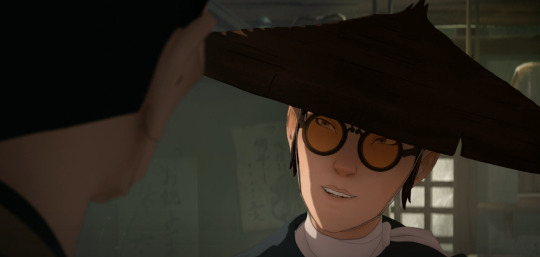

And what's interesting about this, to me, is that fanon is seemingly falling for her deliberate disguise. Because the glasses (with the optional combination of cloak and hat) represent Mizu's suppression of her true self. She is playing a role.

Take this scene of Mizu in the brothel in Episode 4 for example. Here, not only is Mizu wearing her glasses to symbolise the mask she is wearing, but she is purposely acting like some suave and cocky gentleman, intimidating, calm, in control. Her voice is even deeper than usual, like what we hear in her first scene while facing off with Hachiman the Flesh-Trader in Episode 1.
This act that Mizu puts on is an embodiment of masculine showboating, which is highly effective against weak and insecure men like Hachi, but also against women like those who tried to seduce her at the Shindo House.
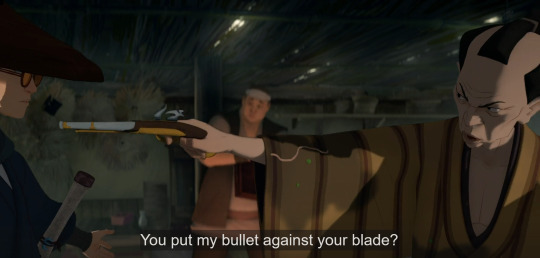

And that brings me to how Mizu's mask is actually a direct parallel to Akemi's mask in this very same scene.
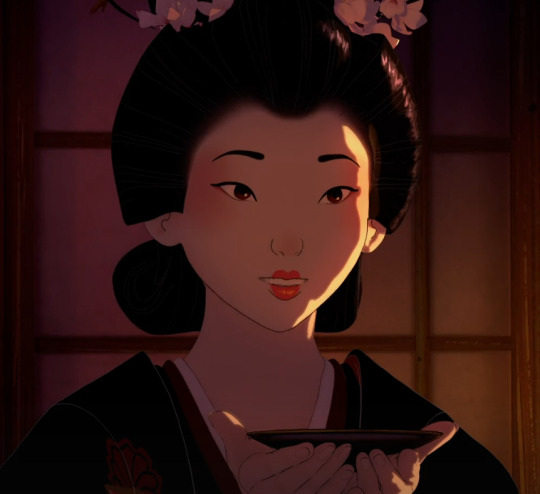
Here, Akemi is also putting up an act, playing up her naivety and demure girlishness, using her high-pitched lilted voice, complimenting Mizu and trying to make small talk, all so she can seduce and lure Mizu in to drink the drugged cup of sake.
So what I find so interesting and funny about this scene, characters within it, and the subsequent fandom interpretations of both, is that everyone seems to literally be falling for the mask that Mizu and Akemi are putting up to conceal their identities, guard themselves from the world, and get what they want.
It's also a little frustrating because the fanon seems to twist what actually makes Mizu and Akemi's dynamic so interesting by flattening it completely. Because both here and throughout the story, Mizu and Akemi's entire relationship and treatment of each other is solely built off of masks, assumptions, and misconceptions.
Akemi believes Mizu is a selfish, cocky male samurai who destroyed her ex-fiance's career and life, and who abandoned her to let her get dragged away by her father's guards and forcibly married off to a man she didn't know. on the other hand, Mizu believes Akemi is bratty, naive princess who constantly needs saving and who can't make her own decisions.
These misconceptions are even evident in the framing of their first impressions of each other, both of which unfold in these slow-motion POV shots.
Mizu's first impression of Akemi is that of a beautiful, untouchable princess in a cage. Swirling string music in the background.
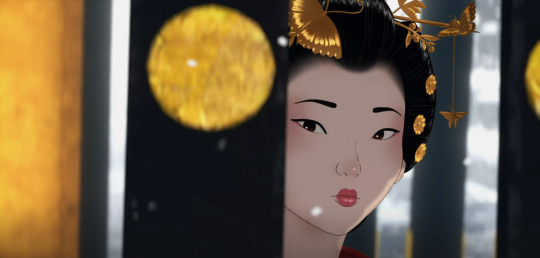
Akemi's first impression of Mizu is of a mysterious, stoic "demon" samurai who stole her fiance's scarf. Tense music and the sound of ocean waves in the background.

And then, going back to that scene of them together in Episode 4, both Mizu and Akemi continue to fool each other and hold these assumptions of each other, and they both feed into it, as both are purposely acting within the suppressive roles society binds them to in order to achieve their goals within the means they are allowed (Akemi playing the part of a subservient woman; Mizu playing the part of a dominant man).
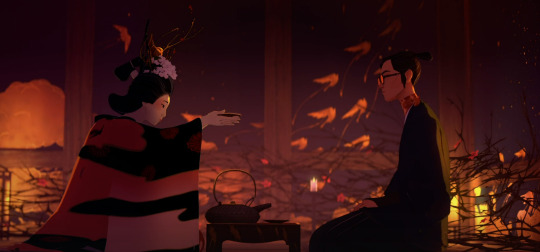
But then, for once in both their lives, neither of their usual tactics work.
Akemi is trying to use flattery and seduction on Mizu, but Mizu sees right through it, knowing that Akemi is just trying to manipulate and harm her. Rather than give in to Akemi's tactics, Mizu plays with Akemi's emotions by alluding to Taigen's death, before pinning her down, and then when she starts crying, Mizu just rolls her eyes and tells her to shut up.
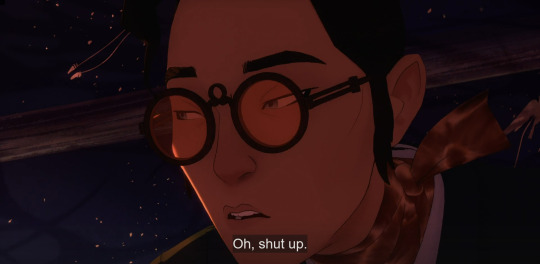
On the opposite end, when Mizu tries to use brute force and intimidation, Akemi also sees right through it, not falling for it, and instead says this:
"Under your mask, you're not the killer you pretend to be."
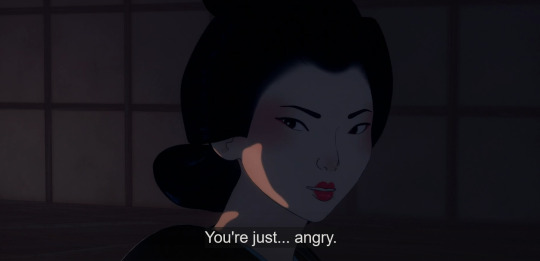
Nonetheless, despite the fact that they see a little bit through each other's masks, they both still hold their presumptions of each other until the very end of the season, with Akemi seeing Mizu as an obnoxious samurai swooping in to save the day, and Mizu seeing Akemi as a damsel in distress.
And what I find a bit irksome is that the fandom also resorts to flattening them to these tropes as well.
Because Mizu is not some cool, smooth-talking samurai with a big dick sword as Akemi (and the fandom) might believe. All of that is the facade she puts up and nothing more. In reality, Mizu is an angry, confused and lonely child, and a masterful artist, who is struggling against her own self-hatred. Master Eiji, her father figure who knows her best, knows this.
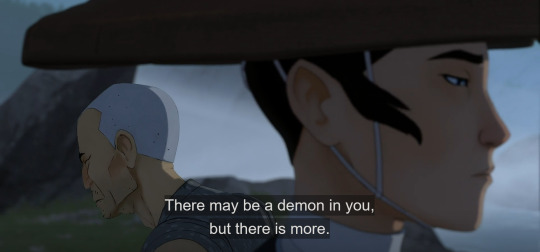
And Akemi, on the other hand, is not some girly, sweet, vain and spoiled princess as Mizu might believe. Instead she has never cared for frivolous things like fashion, love or looks, instead favouring poetry and strategy games instead, and has always only cared about her own independence. Seki, her father figure who knows her best, knows this.
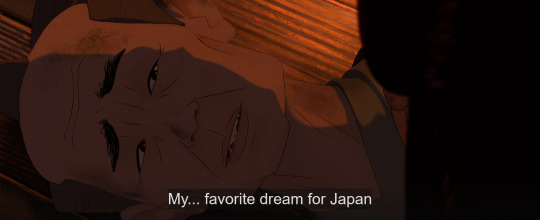

But neither is she some authoritative dominatrix, though this is part of her new persona that she is trying to project to get what she wants. Because while Akemi is willful, outspoken, intelligent and authoritative, she can still be naive! She is still often unsure and needs to have her hand held through things, as she is still learning and growing into her full potential. Her new parental/guardian figure, Madame Kaji, knows this as well.
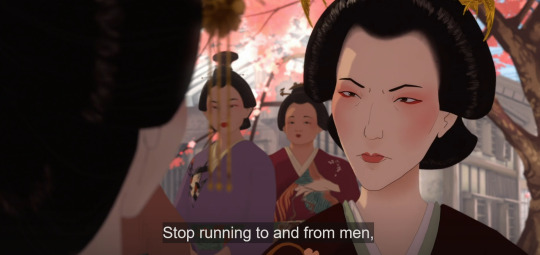
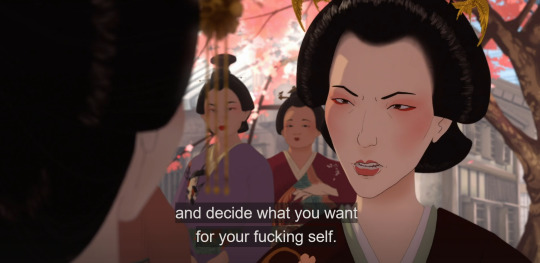
So with all that being said, now that we know that Mizu and Akemi are essentially wearing masks and putting up fronts throughout the show, what would a representation of Mizu's and Akemi's true selves actually look like? Easy. It's in their hair.
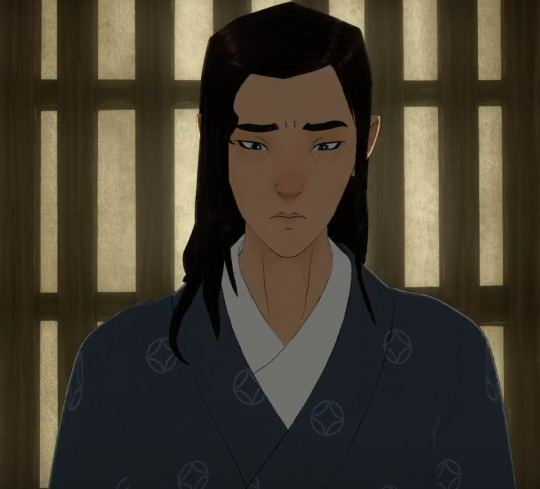

This shot on the left is the only time we see Mizu with her hair completely down. In this scene, she's being berated by Mama, and her guard is completely down, she has no weapon, and is no longer wearing any mask, as this is after she showed Mikio "all of herself" and tried to take off the mask of a subservient housewife. Thus, here, she is sad, vulnerable, and feeling small (emphasised further by the framing of the scene). This is a perfect encapsulation of what Mizu is on the inside, underneath all the layers of revenge-obsession and the walls she's put around herself.
In contrast, the only time we Akemi with her hair fully down, she is completely alone in the bath, and this scene takes place after being scorned by her father and left weeping at his feet. But despite all that, Akemi is headstrong, determined, taking the reigns of her life as she makes the choice to run away, but even that choice is reflective of her youthful naivety. She even gets scolded by Seki shortly after this in the next scene, because though she wants to be independent, she still hasn't completely learned to be. Not yet. Regardless, her decisiveness and moment of self-empowerment is emphasised by the framing of the scene, where her face takes up the majority of the shot, and she stares seriously into the middle distance.
To conclude, I wish popular fanon would stop mischaracterising these two, and flattening them into tropes and stereotypes (ie. masculine badass swordsman Mizu and feminine alluring queen but also girly swooning damsel Akemi), all of which just seems... reductive. It also irks me when Akemi is merely upheld as a love interest and romantic device for Mizu and nothing more, when she is literally Mizu's narrative foil (takes far more narrative precedence over romantic interest) and the deuteragonist of this show. She is her own person. That is literally the theme of her entire character and arc.
#blue eye samurai#mizu blue eye samurai#akemi blue eye samurai#blue eye samurai meta#just in case... im gonna tag this as#mizukemicritical#akemizucritical#though this post isnt actually criticising the ship itself but rather fanon's portrayal of the ship and the characters#for that reason lemme also tag this as#wank.mp3#feel free to disagree of course but please be civil#and if you need to rant about how wrong i am without any convincing evidence kindly feel free to make your own post. peace and love <3#fandom.rtf#meta dissertations.pdf#shut up haydar#edit: for full disclosure. i do rather dislike this ship. but obviously it's fine for anyone to enjoy it. please do! have your fun!#it's just that as usual! popular fanon and fandom around a ship is what has completely deterred me from any sense of enjoyment of it#it's a shame too because i was very open and even eager for some mizu/akemi romance in the future#but out-of-character fanon + the rudeness of certain fans has definitely soured it for me#but that doesn't mean people can't enjoy it obviously! ship and let ship!!!#plus it has its appeal which i DO STILL see and enjoy!!!!#i would even go as far as to call them soulmates because their narratives and characters are LITERALLY intertwined!!!#but. yeah. my gradual distaste for this ship is indeed very unfortunate.
699 notes
·
View notes
Text
I have seen exactly 1 episode of Blue Eye Samurai and I am gobsmacked by how amazing it is. Mizu is already my everything. I am almost never so deeply invested so quickly in any media. I am obsessed. If the rest of the show is consistent in quality with the first episode then this show is Arcane level incredible, and I do not say that lightly.
#please DO NOT spoil me#i am trying to savour the season#and i am PICKY about my shows#i can critique tv all day and that episode just has me amazed and enraptured#the characters the animation the lighting the perspective the scale the action the emotional impact the everything there is so much to love#blue eye samurai#blue eyed samurai#this is the also when I make my romantic subplot oracle prediction that a triad is on the way (hopefully small scale and slowburn)#and as of now it really only works if this show is at least 2 seasons long— howEVER … mizu x taigen x akemi#mizu x taigen#mizu x akemi#taigen x akemi#mizu x taigen x akemi#i don’t really care about taigen x akemi but add mizu to the mix plus a zuko type arc for taigen and akemi as a lord/leader and oop it works#mizu/akemi#mizu/taigen#taigen/akemi#mizu/akemi/taigen#mizu blue eye samurai#look at me#one episode in and so confident about everything#sigh
983 notes
·
View notes
Text
I wondered how the Guillermo del Toro adaption of Pinocchio was going to do the Blue Fairy, and oh. Oh wow.
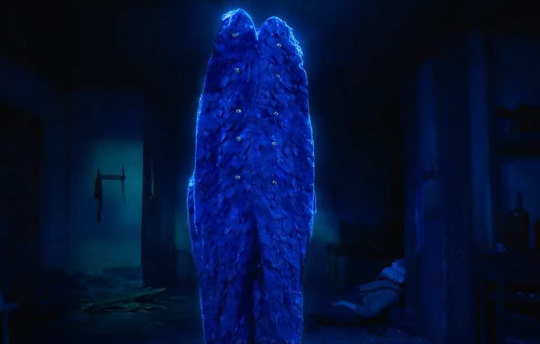
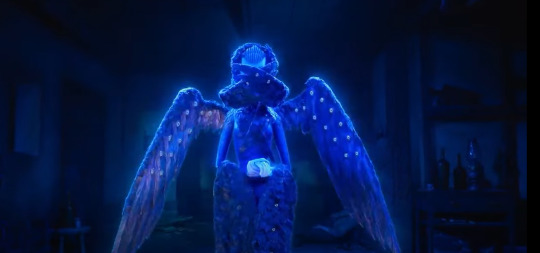
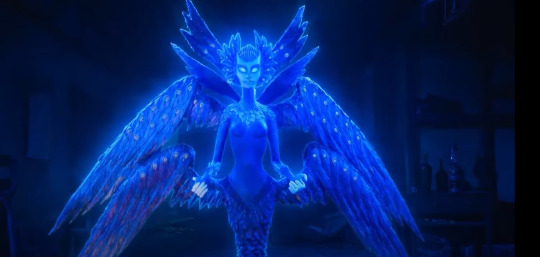
Oh wow.

#you know it's a del toro film when the wings have eyes#plus voiced by#TILDA SWINTON#the blue fairy#blue fairy#guillermo del toro#guillermo del toro's pinocchio#pinocchio#pinocchio netflix#every angel is terrifying
4K notes
·
View notes
Text
I love that there are advancing levels to Fowlers boredom while spending 10 years cooped up in his private castle. In addition to planning a hostile takeover of Japan he
Learned to paint
Set up a sex/torture dungeon that involved him getting pegged on the regular
Trained monkeys to throw hallucinogenic dust at people, so that potential invaders would have to fight though the heavily armed, super booby trapped castle while tripping balls
#blue eye samurai#abijah fowler#How booby trapped does your castle have to be before you decide on hallucinogenic monkeys?#Plus adding a surveillance system so he could watch potential invaders fight the monkeys
752 notes
·
View notes
Text
Why have I not seen anything about the bisexual flag colors littering this scene with Taigen and Mizu?!?!

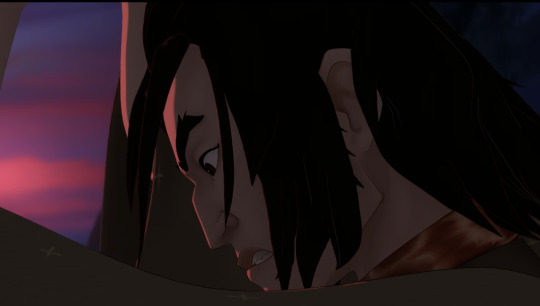
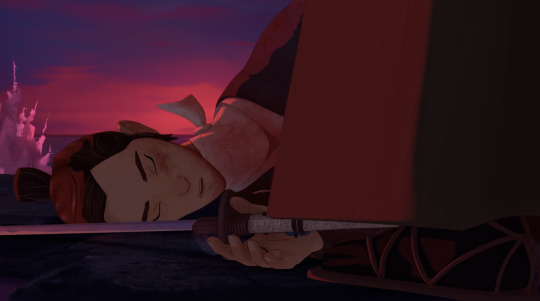
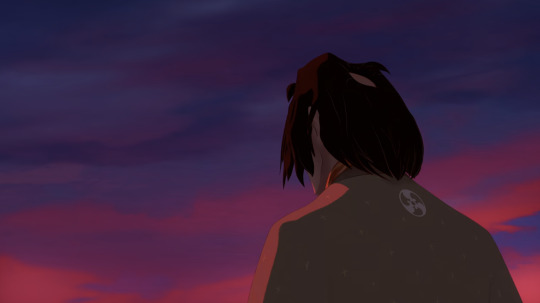
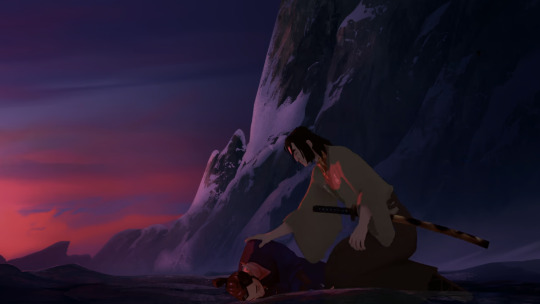
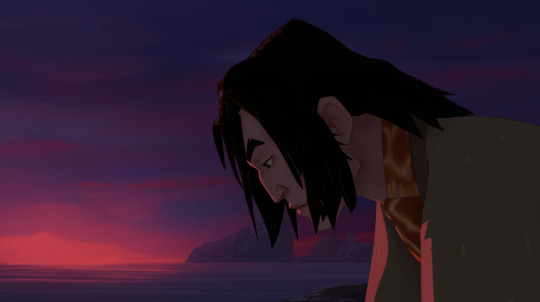
#mizu x taigen#mizu#taigen#blue eye samurai#I'd love for it to end as a throuple but that's just me lmao#they clearly took notes from the legend of korra lmao#plus mulan#bisexual#everyone is bi your honor
351 notes
·
View notes
Text
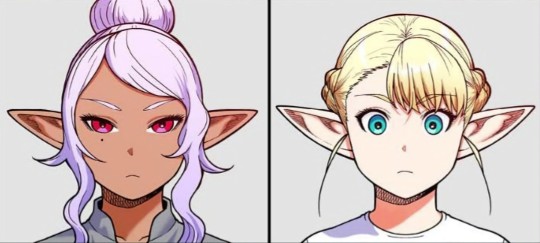
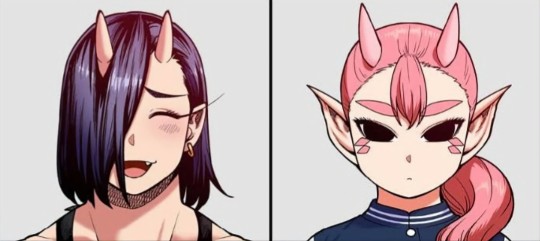
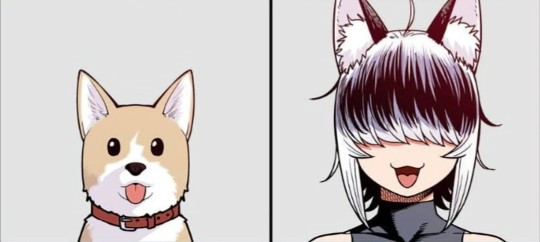
#Shin Elf-san wa Yaserarenai#Plus Sized Elf#Erufuda#Kuroeda#Manga#Manga Cap#Blonde Hair#Blue Eyes#Silver Hair#Red Eyes#Purple Hair#Pink Hair
203 notes
·
View notes
Text
The parallels between Tsubomi and Reigen drive me so fucking insane you have no idea like—that shit had to be at least SOMEWHAT intentional even if not in a specifically romantic way.
For one, Tsubomi and Reigen are two of the only few people that call Shigeo "Mob" consistently. (Yes Tome also calls him Mob eventually but she starts out calling him Kageyama-kun and likely picks up "Mob-kun" from Inukawa or Reigen later on). We don't know how Reigen started calling Shigeo "Mob", though we can assume that Tsubomi was likely part of the group of kids that originally misread Shigeo's name as Mobbu to begin with so she's less of a mystery on that front. Maybe Reigen saw it written on his backpack or his shirt tag and started calling him that too, or maybe Mob even just told him that that's what everyone else called him and was what he prefered to be called at the time. Either way, it's a little odd that Reigen's one of the only people who use that nickname when we don't really get a reason why beyond "it can also be read like this", especially since Reigen is a grown man with (presumably) full literacy of kanji and would know how to read it.
Then there's the other obvious parallel that's made in the show; how Tsubomi and Reigen treat Mob. How they see his powers. They're not special, they're just a part of him. Nothing to be scared of—even though they kind of,,,,are lmao. The fact that Tsubomi continues to sit in the park even though a literal hurricane is approaching because she thought Mob sounded upset on the phone happens at the same time Reigen goes sprinting full-tilt into said hurricane because Mob is in trouble always stands out to me. It's less obvious than Mob's own words: "She never treated me any differently because of my powers" "Master never treated me any differently..."—but it's still a pretty blatant parallel to me.
Not to mention that both Reigen and Tsubomi's personalities are actually very similar as well! They're both described as people that hide behind a mask, a facade, while still being brutally stubborn. If Tsubomi doesn't want to do something, she's not gonna do it. While Reigen is more laid back because he's used to getting his hands dirty for work (money), he's still very stubborn himself when he doesn't wanna do something. He'll find a way to wriggle out of it and talk circles around you if you let him. Dimple even says that Tsubomi is the type of person who can't be swayed by words or peer pressure. She and Reigen were actually, again, two of the only people brainwashed through airborne Vibes™ instead of through food like everyone else. The biggest difference between them on this is that while Reigen lies fairly blatantly, Tsubomi seems to only lie through omission. Tsubomi is more of an introvert too, compared to Reigen's extrovert (though you could argue that both of them are good with people, with the only difference being that Reigen enjoys being the center of attention while Tsubomi presumably does not).
Plus they're both pretty goofy too once you think about it lmao. They're both prideful and hate to be humiliated, but they also care a lot about their public image and how people perceive them. Every time the scene with Tsubomi and her friends outside cleaning up leaves comes up, her expressions and panic always remind me of Reigen. And then there's Mob, calm and unjudgemental, willing to help her with no questions asked. Mitigating her humiliation, just like he does for Reigen :)
Another thing that always strikes me is how Mezato says, "If you can accept her for who she really is..." followed by Reigen's echo during his confession: "This is who I really am". Mezato essentially tells Mob that Tsubomi isn't who she seems on the outside and that if he wants to be accepted by her, he needs to also be ready to accept her as well. Which, we don't get to see much of Tsubomi's life outside of Mob—wow just like Reigen—so we don't ever really know who she is beyond that outer mask, but we see her slowly opening up to Mob later, as a friend. But the fact that Reigen's own confession mirrors Mezato's words to Mob about him accepting Tsubomi always makes me vibrate in place a little like,,,Confession Arc my beloved 🙏
I don't know man, there's just so much there, it makes my head spin. I could go on and on about it but I better cut myself off because if I don't I'll start crawling on the walls going feral about it because what, what was the point of this if not to make it clear that the relationship between Mob and Reigen is supposed to parallel his relationship with Tsubomi like what do you MEAN—
#mobrei#reimob#tsumob#mob psycho 100#reigen arataka#takane tsubomi#parallels#iVE CONNECTED THE TWO DOTS#you didnt connect shit—#IVE CONNECTED THEM#kageyama shigeo#mob#obviously the solution is that im supposed to ship the polycule#right? thats what im gaining from this? tsubomi to mob to reigen to tsubomi to mob pipeline?#tsumobrei?#tsumobrei#i think about this all the time you have no idea#plus the way that mobs flowers in the title sequence match his eye color and color scheme but reigens flowers match. tsubomis color scheme.#mobs flowers are deep red and white and reigens flowers are fuckin BLUE and PINK like cmon now#its bonking me over the head at this point like i GET IT
82 notes
·
View notes
Text

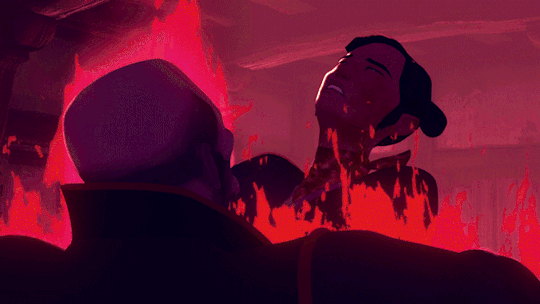
"All Evil Dreams and Angry Words" - Blue Eye Samurai, Ep. 6
#blue eye samurai#mizu#i was gonna make this better quality but im L A Z Y Y Y Y today#plus i just wanted to have this gif'd already so i can use it as a discord banner lol#might remake it later tho idk#mine
142 notes
·
View notes
Text
Besides height differences, I realized how much I like hand differences with my ships


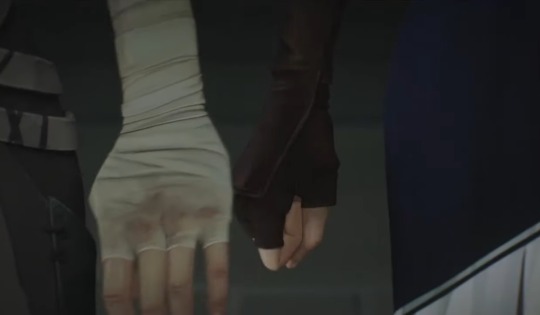

#mizemi#timebomb#meljay#caitvi#mizu x akemi#akemi x mizu#blue eye samurai#bes#arcane#my post#I love the tb one bc one of these is not like the others#plus the timebomb height difference is only fanon💀 they had ONE scene in S1 and it was literal violence😭#ANYWAY#Big hand x little hand combo is so precious to me💖❤️💖❤️
142 notes
·
View notes
Text

I don't think I've ever posted this here, but this is for that one #BibeNiLucifer trend thing going on. Luci's in his human form here because the church may call him a demonyo o bakla with all that "make-up" on his face. Which, fair enough, but still. XD He's supposed to be incognito while traveling the Philippines. Lmaooo I can just imagine Aling Susan chasing him around with a walis tingting and her gossiping with the other ninangs about that "porener na mukhang bading" LOLOLOL. 🐤🐤🐤
He's such a ✨️bibegurl.✨️💅
-Bubbly💙
#May tatlong bibe akong nakita#Mataba mapayat mga bibe#Ngunit ang may pakpak sa likod na iisa#Siya ang lider na nagsabi ng kwak kwak#kwak kwak kwak#Bibe Ni Lucifer#ph#philippines#spacebubblearts#hazbin hotel#lucifer morningstar#hazbin lucifer#hazbin hotel lucifer#lucifer magne#twitter#because I REFUSE to call it X#hair clips#ducks#duckies#trend#ducky#hell's greatest dad#bibegurl#my take on his human design#made the black of his arms a part of his nails#he's wearing barong here#and gave him brownish red eyes because tho I love blue eyed human Luci#I really think brown is closer to his real eye color which is red#plus he would fit right in with the country he's visiting here#amazon prime
81 notes
·
View notes
Text
Blue Eye Samurai & Themes of Breaking Free from Binaries and Boxes
Mizu must choose between being a woman or a man, between feminine and masculine.
Mizu must choose between being Japanese or white.
Mizu must choose between being human (loving) or demon (hateful).
Mizu has struggled against the chains placed upon her since birth, but no matter how much she writhes and pushes against them, the chains remain. And they will continue to, until she learns to accept all of those facets of herself and suppress none of it.
Mizu must realise that she is both feminine and masculine; Japanese and white; human and demon. Mizu is all of these things and everything in between and at the same time she is none of them. She is simply Mizu. Only upon accepting this can she slice through the chains and find freedom.
But Mizu isn't the only one faced with these stifling binaries and predetermined paths. Each of the main four characters represent this theme as well.
"This is the world. It grants women a fixed number of paths. Proper wife or improper whore." -Seki, to Akemi
Akemi, as a woman, must choose between being a wife (modest, meek, but rich) or whore (sexually liberated, willful, but exploited). Both of these would amount to defeat, both of these are cages. So what does she do? With the cards she's been dealt and the rules outlined for her, she decides to change the game so she can win, manipulating her husband (and father, who is now under her care) to give herself the advantage. This way, she blazes her own path ahead to achieve power for herself.
"As it says, there are four paths through the world. The way of the farmer, the artisan, the merchant, and the warrior. Each of these can lead to greatness. I never even cared which path, so long as I found mine." [...] "I know I can't touch greatness any more than I can swallow the sun. But, I can help. I can help greatness." -Ringo
Ringo, partially due to his disability, faces barriers succeeding any of the predetermined paths set out for him, but freely moves between each one in search of one that can lead him to greatness. However, upon meeting Mizu, his horizons expand. Now, he forges his own path, deciding to rise beyond a quest for his own greatness, choosing to instead to help greatness. This is similar to the role teachers take. Teachers do not get to be rich or successful or written into history books, but they help, teach, and inspire others so that they can rise up to their fullest potentials.
"Eighty-four thousand Dharma doors. For me, there were only two. The net or the sword. I could become my father, or I could cut my way free of the net." -Taigen
Taigen, born and raised impoverished, had only two options to survive. He could either be a fisherman and remain poor, or he could strive to work hard as a swordsman in the hopes to one day escape poverty. To him, it was a choice between a life of suffering or a chance at glory. Either way, the chances of dying (from either starvation or getting killed) were present, so obviously he'd taken the chance to run away and try his hand at greatness. But then, he lost his honour, and thus lost everything. Now his only choices are to regain his honour or simply kill himself. He tries the former, but upon bonding with Mizu and Ringo, he finds out there is more to life, that there is a third option open for him he'd never realised before: happiness. Rather than just mere survival, or toiling for material gain, he realises that life is about living.
Overall, the story is very multifaceted through its exploration of societal expectations and norms, and how people are forced to conform, but also the ways they can break free from those boxes.
And in my opinion each of the characters represent differing aspects of marginality, and can be analysed from differing perspectives.
Akemi's story is a predominantly feminist narrative about the marginalisation of women.
Ringo's story is a predominantly disabled narrative about the marginalisation of disabled folks.
Taigen's backstory is a Marxist narrative about the marginalisation of the poor and working class.
Mizu's story is most prominently a postcolonial narrative about the marginalisation of racial Others, ethnic minorities, and hybridised identities. However, as the protagonist, Mizu's story is the most multilayered and thus also heavily features feminist, queer, and Marxist themes due to her complex relationship with gender as well as her background as an orphan living on the streets.
I just found it very interesting that, altogether, the four main protagonists each represent groups that are fighting against an unjust system.
Even Takayoshi, son of the shogun, who should thus be one of Japan's most powerful men himself, is instead seemingly powerless as he is silenced and manipulated by his own mother due to his disability—his stutter.
I also find that these themes of breaking free from conformity and expectations are very interestingly displayed in Taigen, who had thought he'd found a way to join those unjust systems and play by all its rules, and by doing so he had played the role of antagonist. Because one of the central conflicts of the show is Man Vs Society, in which society is the antagonist and the man is Mizu, among others. So by becoming one with that cruel society, Taigen in turn also becomes Mizu's antagonist. Only when he is stripped of everything, all his years of struggle immediately stomped into the dirt as soon as he loses a single duel, only then does he shift away from his antagonistic role. Disgraced and dishonoured, he, too, now rejoins the margins of society, becoming an outcast alongside Mizu and Ringo.
So, TL;DR the society and world portrayed in Blue Eye Samurai is shitty for pretty much everyone unless you're a rich, corrupt, able-bodied cis man. Thus, essentially no one is free and everyone is restricted into neat little boxes where they play their roles and stay in line while the rich and powerful benefit. But Mizu, Akemi, Ringo and Taigen challenge this, and slowly they will rip the boxes go shreds—choosing what they want, and what they want to be, for themselves.
#blue eye samurai#mizu blue eye samurai#taigen blue eye samurai#blue eye samurai meta#akemi blue eye samurai#ringo blue eye samurai#also all of four of them are mistreated by a parent to varying degrees. for ringo taigen & akemi it's their dads. for mizu it was her mama.#plus mizu's dad is believed to have assaulted her mom so.#they all have parental trauma lmao.....#the more i think about this show i go crazy#scheduling this post#shut up haydar#meta dissertations.pdf#mizu is non binary in every way !!!!#she just like me fr !!!!#fandom.rtf
83 notes
·
View notes
Photo

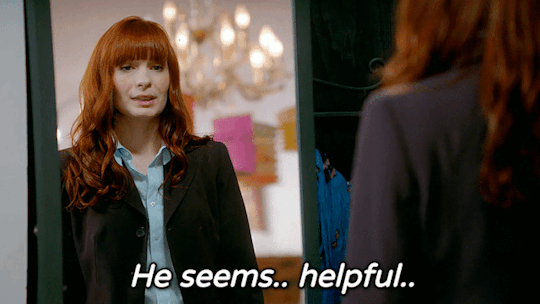
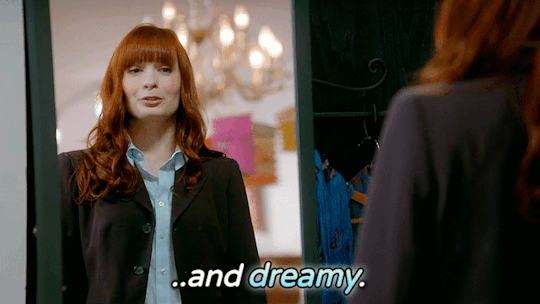
said the lesbian about a guy to the "straight" guy
#spnedit#dean is bi#charlie bradbury#spn 8x20#destieledit#women of spn#charlie#castiel is helpful and dreamy#charlie says so but moreover thinks dean thinks that way and is helping him voice those thoughts#brotp#holyshi--just realised there's a chandelier behind her like the many angel eyes of cas omg#plus the pink and blue visuals in view ie. bi!Dean#myedits#dean winchester is bisexual#lgbtqia#queer characters#8x20#season gr8
1K notes
·
View notes
Text
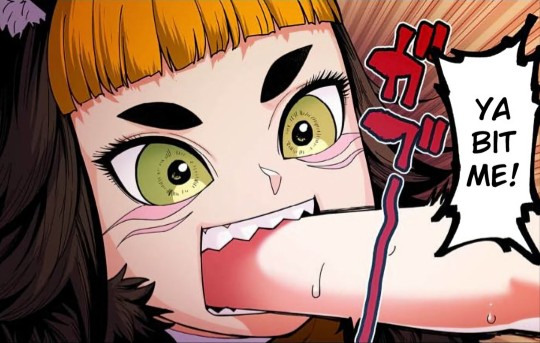
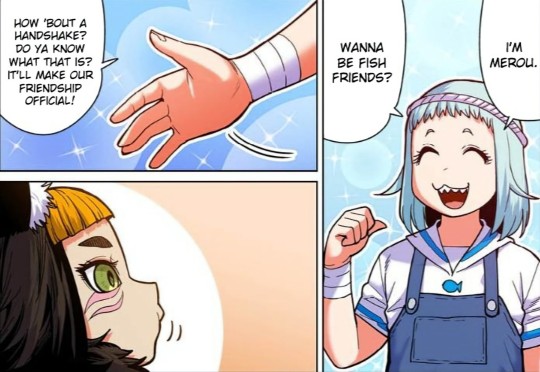
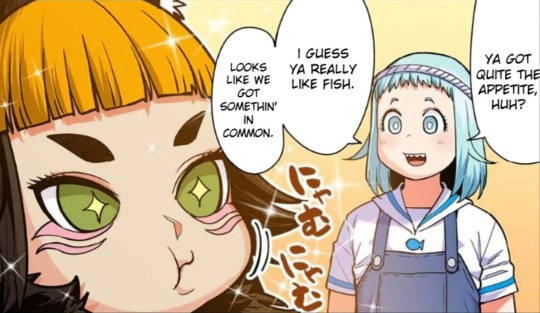

#Shin Elf-san wa Yaserarenai#Plus Sized Elf#Manga#Manga Cap#Blue Hair#Blue Eyes#Brown Hair#Green Eyes
191 notes
·
View notes
Text
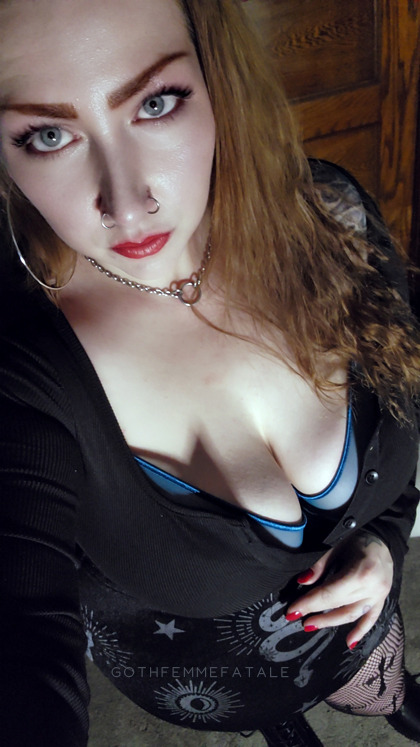
Oh, hey
75 notes
·
View notes
Text

not your baby. 😘✌🏻
#me#my face#selfie#arkansas#selfies#blue eyes#girls who smoke weed#cannamom#cannacutie#girls with tattoos#inked and curvy#curvy af#curvy girls#plus size princess#mine
65 notes
·
View notes
Text

girl please, Charlie Swan is Team Werewolf and you know it
#it's like Bella has no conception of the socioeconomic symbolism attached to these monsters!!#girl why on earth would the middleclass police chief of a tiny rural town in Washington#choose the wealthy murderous parasites?????#OK besties as i'm typing that out i see why charlie might side with the wealthy murderous parasites#yes he IS an american cop so siding with the parasites does make sense#but think of all the paperwork he would have to do when the cullens kill someone! i mean. come on.#also it aint like cullen out there paying off the pigs so really what is Charlie getting out of this relationship#it's no bribes all paperwork? i don't care how American this cop is he is Anti Vamp and that's that on that#WEREWOLVES on the other hand......... besties let's review the cold fax ok#they're a blue collar blue jeans blue skies all day baby kinda monster. crack open a cold one with the boys kinda monster.#pull over on the road to lend you some spark plugs kinda monster. bring a dairy-based dip to the charity softball game kinda monster#big plus: they're on the DL. neat & tidy cover story. no killing. protect & serve yeah baby. no parasites here my boys WORK for a living#the boys are 0% paperwork (no killing) and 100% bribes (dairy-based dips)#Charlie's deffo Team Werewolf at best and turning a blind eye at worst#as far as this man's concerned the werewolves are the Olympic Natl Park rangers' problem#bear who???? don't know em#twilight#twilight renaissance#bella swan#the twilight saga#jacob black#charlie swan#eclipse read
302 notes
·
View notes